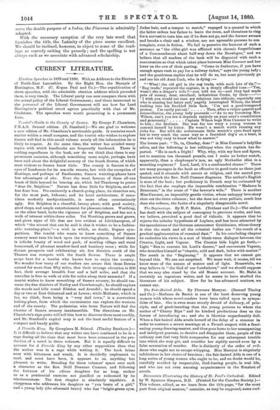A Fireside King. By Georgiana M. Stisted. (Tinsley Brothers.)— It
is difficult to believe that any writer can have continued to be in a rage during all the time that must have been consumed in the pro- duction of a novel in three volumes. But it is equally difficult to account for A Fireside King by any other supposition than that the author was in a rage while writing it. The book brims over with bitterness and wrath. It is decidedly unpleasant to read, and must have been, it appears to us, anything but pleasant to write. Brooding for three volumes' space over such a character as the Rev. Neill Dansane Camner, and following the fortunes of his odious daughter for as long, strikes us as a penitential exercise not justified or redeemed by its wholesomeness. The first chapter is absolutely repulsive. A clergyman who addresses his daughter as " you brute of a girl," and a young lady (the aforesaid brute) who has "bright-green eyes, Judas hair, and a temper to match," engaged in a quarrel in which the latter orders her father to leave the room, and threatens to ring for a servant to turn him out if he does not go, and the former swears and breaks a chair and a window, are not agreeable persons to con template, even in fiction. We fail to perceive the humour of such a sentence as "the elder girl was afflicted with chronic forgetfulness of a Commandment about half-way down the Decalogae," and we believe that all readers of the book will be disgusted with such a conversation as that which takes place between Miss Cumner and her ]over on the eve of their parting. " Come to Sntherton, if you have enough spare cash to pay for a railway ticket," says the young lady ; and the gentleman replies that he will do so, but must previously go and see his old Aunt Cook, who is dying :- "' What ! the old girl in the rag trade, with such lots of tin Rag trade,' repeated the captain, in a deeply offended tone.—'Yes, wasn't she a draper's wife ?—yon told me so—and they had made pots of money, dear, excellent, industrious Cooks, by their—'—
I wish you would not turn my relations into ridicule, especially one who is nearing her latter end,' angrily interrupted Wilson, the blood rushing into his freckled little face. 'I'm not a good-tempered
person. I'm easily put out.' Then, after a vulgar quarrel and reconciliation, the young lady proceeds :—' As to my becoming Mrs. Wilson, can't you see it depends entirely on your aunt's constitution
and generosity.' Captain Wilson begs Miss Cumner to write to him ; she declines. She was far too wary a young woman to commit herself by letter. He wasn't a match worth running any risks for. But with the unfortunate little wretch's eyes fixed upon her in very much the same way as a famished dog's on a bone, it was not very easy to know what to answer."
The lovers part: " Ta, ta, Charley, dear I" is Miss Cumner's ladylike adieu, and the following is her soliloquy when the captain has de- parted. " He is such a fright ! Why, why, with my face and figure, not to mention ten thousand pounds, can I make no better match, apparently, than a shopkeeper's :son, an ugly Methodist idiot in a marching regiment ? Lord, Lord, it's a confounded shame !" There are many passages in the book as offensive to good-taste as those just quoted, and it abounds with sneers at religion, and the sacred pro- fession which the Rev. Neill Cumner disgraces. The author's English is none of the best ; her proficiency in French may be estimated by the fact that she employs the impossible combination "Madame la Brasseure," in the sense of " the brewer's wife." There is another Miss Camper, an impossibly gentle victim, whose unhappy love-story ekes out the three volumes ; but she does not even palliate, much less does she redeem, the faults of a singularly disagreeable novel.






























 Previous page
Previous page